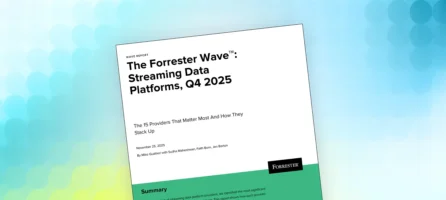Get Instant Answers with Ask AI on Hazelcast Documentation
We’re delighted to announce we’ve added powerful new AI functionality to our docs website. On every docs page you can now click the Ask AI button in the bottom right and get instant answers to all your questions about Hazelcast Platform and our tools and clients. This Ask AI functionality is powered by the entire suite of Hazelcast documentation, including the latest docs from docs.hazelcast.com, the various API docs microsites, the latest official blogs, and a bunch of code samples and support knowledge base articles. The developer experience is crucial to everyone at Hazelcast and Ask AI gets you accurate answers quickly.
You can try one of the example questions for quickness, or maybe there’s something you’ve always wanted to ask or check (like, ‘What is an in-memory data grid anyway?’). You can ask follow-up questions or clarify the context and scope more precisely until you get the answer you want. Most of the time, you get all the information you need in a single response, but you can also use the linked sources to check details if you like.
Try it now
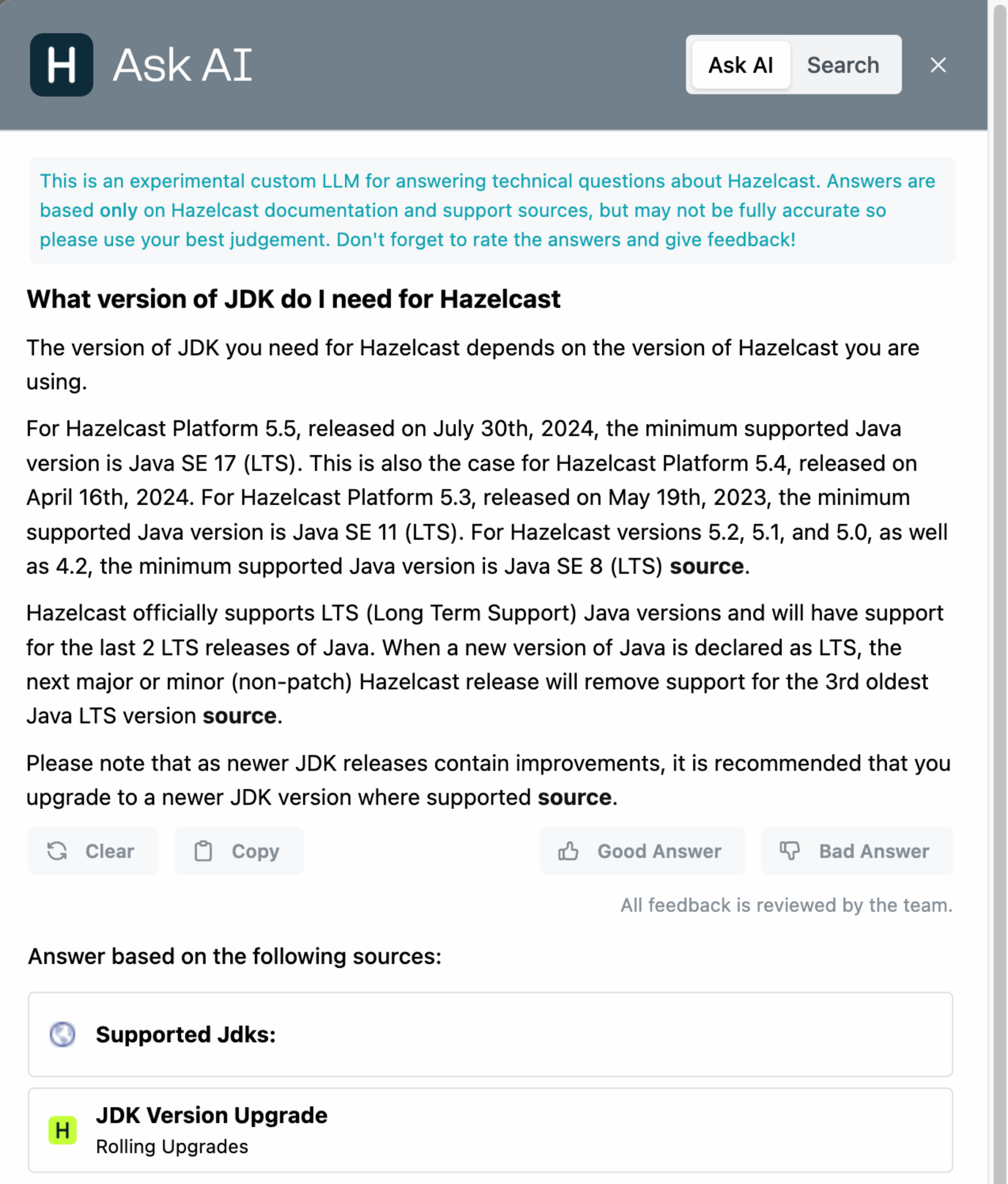 |
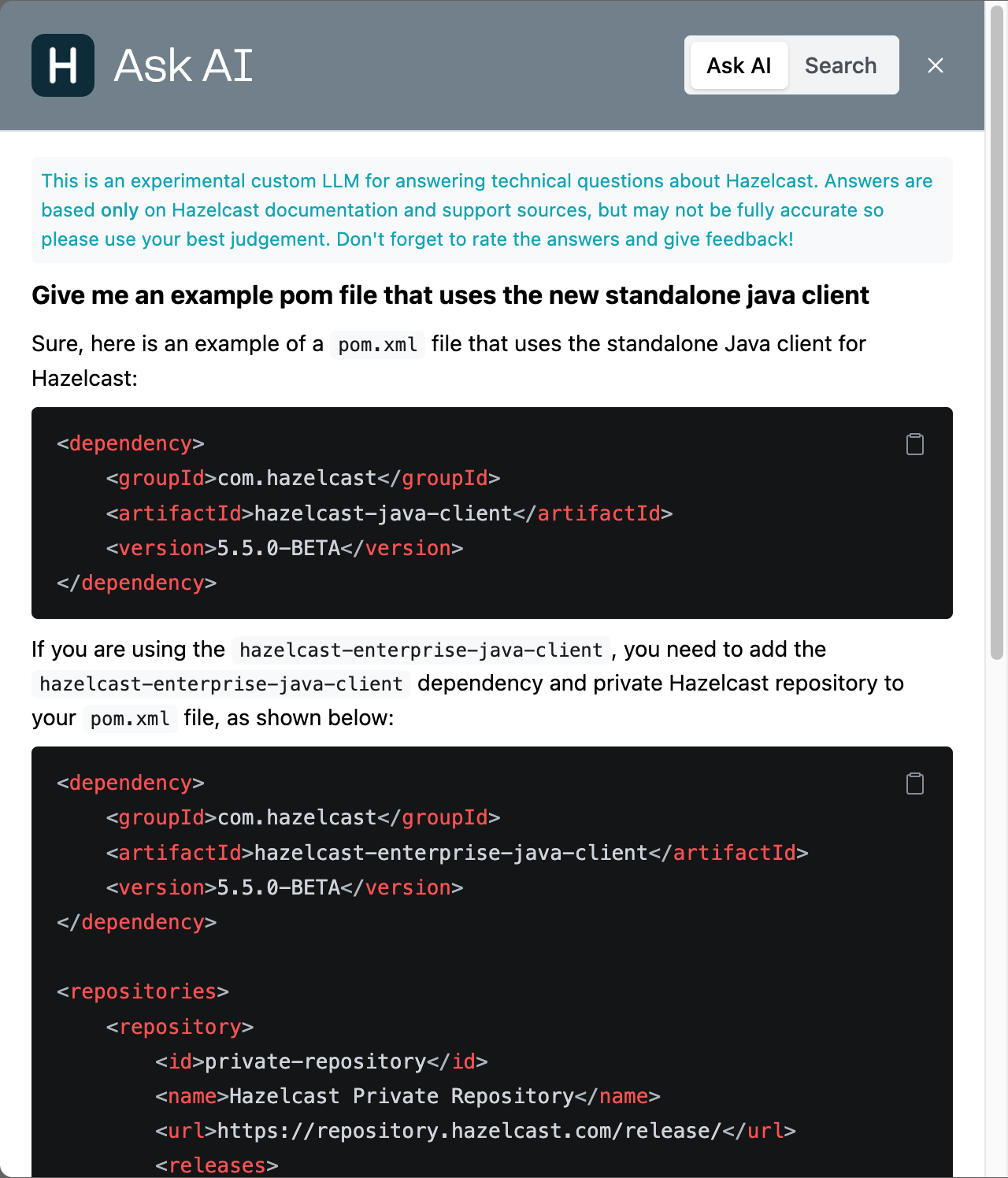 |
 |
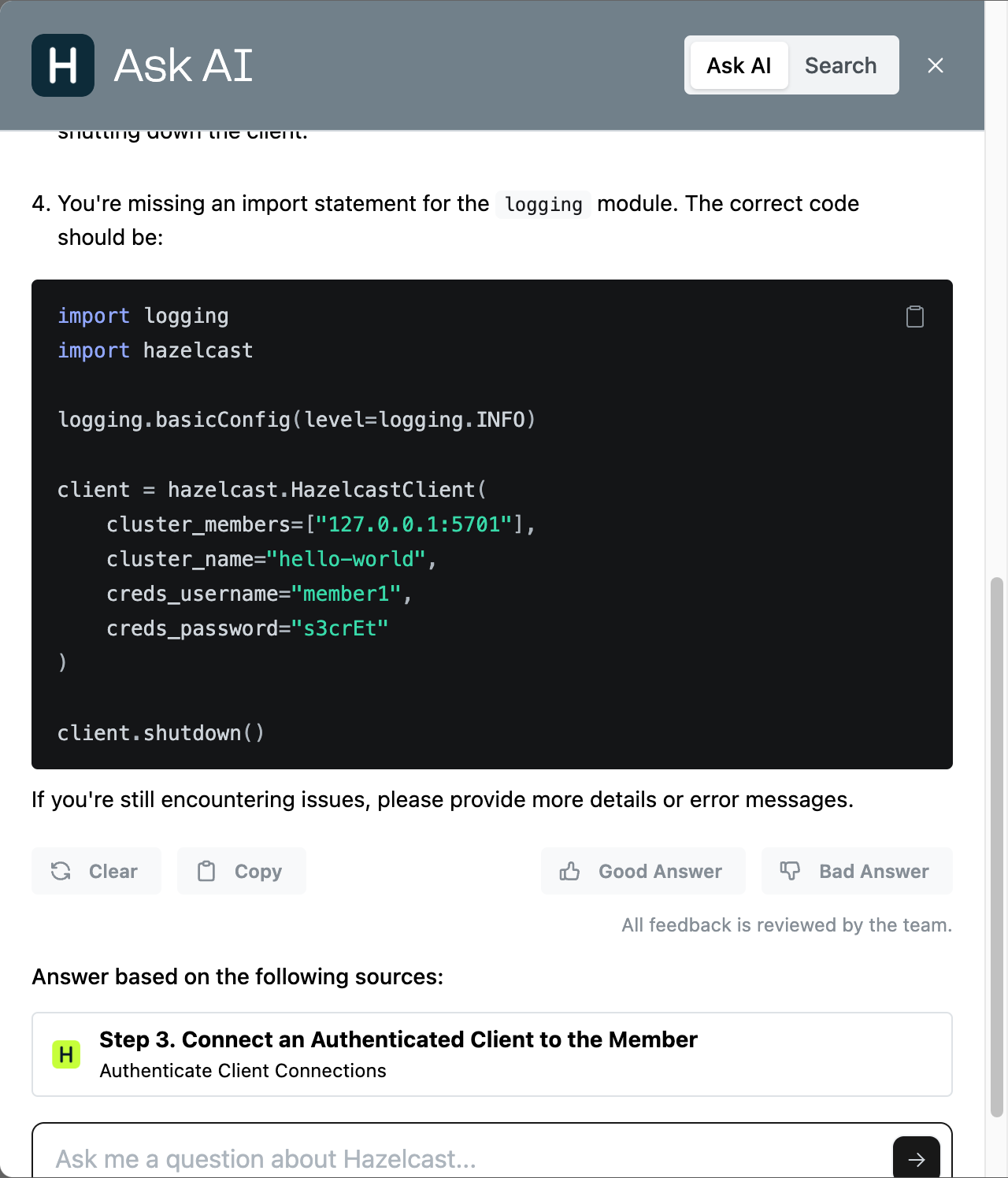 |
Give it a spin, dig into some technical topics, and see how effective it can be to recommend changes based on the documentation. We’ve been using this internally for a few months and would love to hear your thoughts and any innovative ways you’ve used (or broken) it. Please make sure to use the vote buttons and give detailed feedback after voting. You can also share feedback in the Hazelcast Community Slack.
Learning the easy way
With Ask AI you get accurate answers based on the latest official technical content, without iterating searches or navigating through different products or releases. It can combine content from different sources and give you a concise, well-written summary with links for any extra detail you need. You can ask follow-up questions or clarify what you want in a conversation rather than have to retype or start a search from scratch. You can also use the Search tab to globally search all the same sources from a single place. Ask AI eliminates search and is a shortcut to quickly becoming an expert user.
I joined Hazelcast at the start of 2024, and as with most complex technical products, there’s a lot to learn. Hazelcast Platform is a highly technical yet configurable platform that requires detailed documentation and code examples to deploy, configure, and operate optimally. Problems can occur that require rapid troubleshooting and resolution. Everyone gets frustrated when you can’t find answers or solve problems quickly. I wish I’d had this Ask AI functionality at the start of my Hazelcast adventure (but it’s not too late for you…)
The main Hazelcast Platform documentation repositories are all public and, excluding the various API and client microsites, contain over 160k lines of code and 600k words. For comparison, War and Peace (the most cited ‘weighty tome’) only contains 580k words. So, each major release of our software suite is another War and Peace (though roughly only around 15% of the words might change). The sheer volume of technical content is one issue with gaining mastery of a complex product like Hazelcast.
We also have several sources (products, tools, versions, etc.) to navigate between and a search that isn’t quite global (some externally hosted API docs are not indexed by our current search, but do show up in Ask AI searches…try it!). And we have a lot of content, not all of which is as perfectly structured or written as we would like (most docs teams have a large backlog, and we’re no different…). As internal users of our docs, we also feel the pain, and we appreciate it can be multiplied for customers and external users where the time and commercial pressure is even greater. Ask AI cuts through these challenges and get you the crucial information and recommendations you need sooner.
RAG and Large Language Models (LLMs)
Hazelcast’s new Ask AI functionality is an LLM-powered chatbot trained on Hazelcast Platform documentation and technical content. It leverages a retrieval augmented generation (RAG) system to provide accurate and context-specific answers to technical questions. This approach is different from a general-purpose AI model like ChatGPT, which generates responses based on their training data without retrieving specific external information. This strategy means it will have some knowledge of Hazelcast Platform from publicly available sources. Still, it is liable to hallucinate where it doesn’t know the answer and often doesn’t have the latest updates.
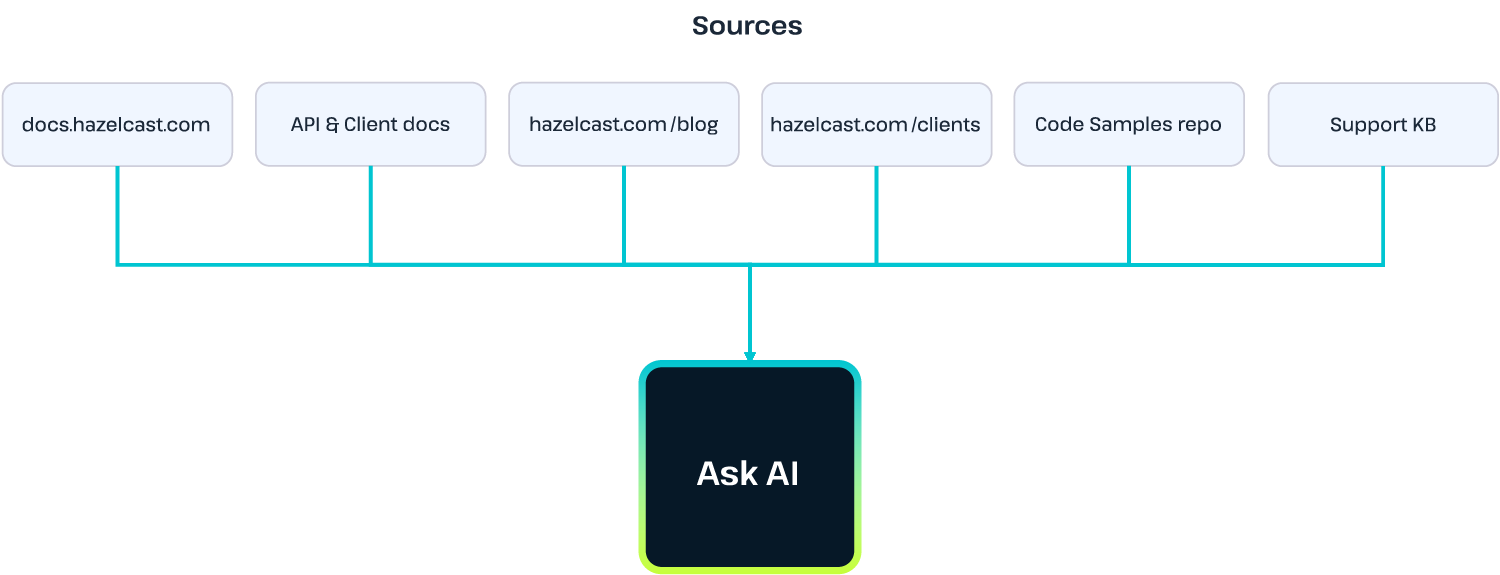
Our chatbot has indexed over 5k Hazelcast pages and uses this technical knowledge to answer your questions and queries. We use LLMs to generate the responses and include links to the specific Hazelcast sources in each case. It can only answer if the content is documented and indexed; it will say so if it doesn’t know the answer. It’s optimized for English but can respond in various languages, which can help bridge the language gap for our global audience of developers, architects, and operators.
Feedback is crucial to assessing and improving the quality of responses. Use the vote buttons if you get a good or bad response and, if you can, tell us why. We’ll use the feedback to improve the responses and target documentation areas that need editing, expansion, or updating. You can also try the Search tab within Ask AI – it uses the same sources and indexes more than the existing search at the top of every docs page.
 |
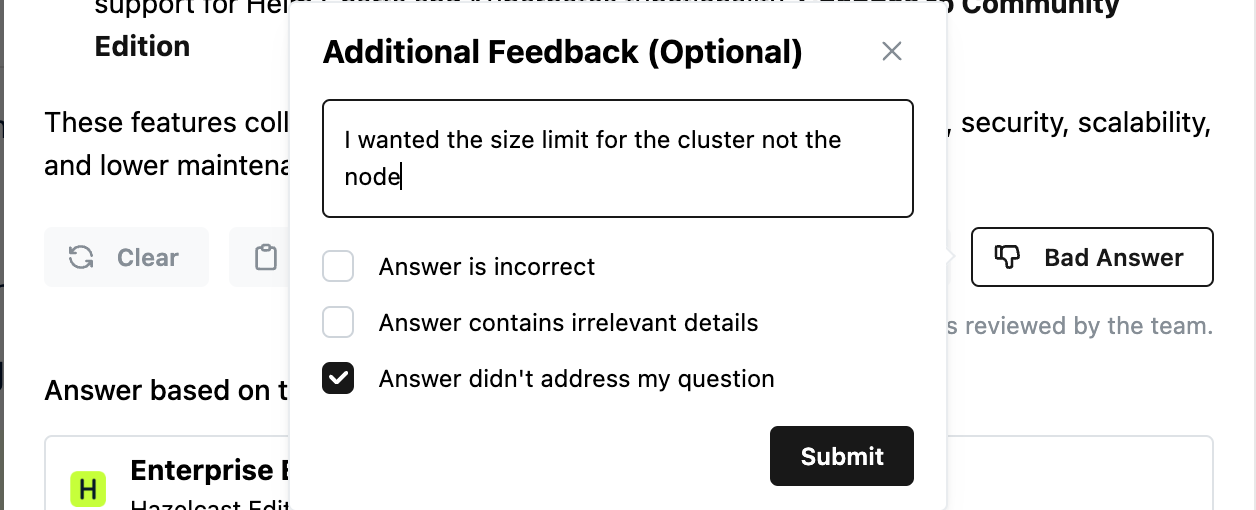 |
Single source of truth
We take our documentation seriously at Hazelcast. It’s truly a team effort and we all try to contribute to the documentation and make it the first (and last) place to look for understanding, configuring, and using our products. We also have a huge range of technical sources and content types, as well as knowledge from within Hazelcast. The goal is to make our documentation the single source of truth – always correct, complete, and helpful.
We’re determined to bring innovative improvements, such as Ask AI, to our users for refinement and improvement of technical content to make our products as intuitive and rewarding as possible. We also know we have lots to do here – help us focus on what matters most to you by giving us feedback via this short docs survey. Look out for a follow-up blog on documentation for the new year!


